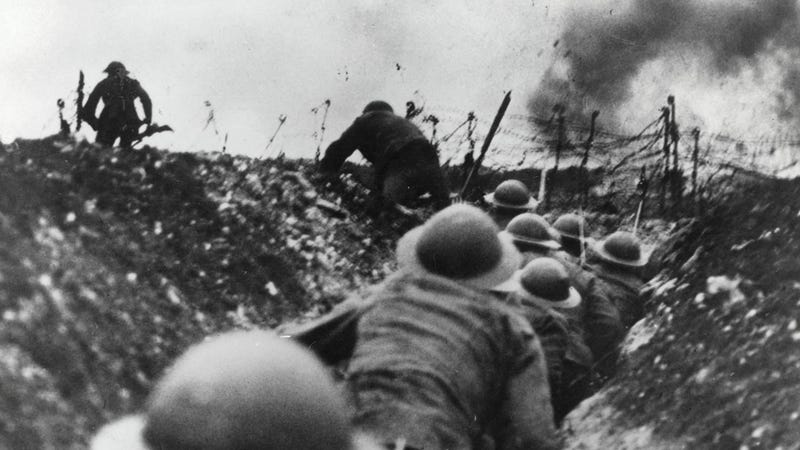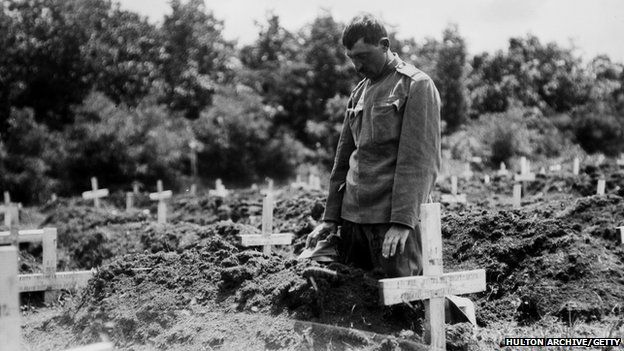History Stories: The war that should end all wars...
 •
by
•
by Zinitus
On this day, Nov. 11th 2018, it is 100 years since the armistice of World War I.
It was until then the most damaging war in history, about 19 million deaths, and in addition, millions and millions of wounded. It was the first big-scale industrial war, with new “inventions” of tanks, submarines, gas, aeroplanes and so one. And another characteristic of this was the trenches and stall math by the fronts, especially in the west. During the years from 1914, the continent had seen terrible and inconclusive battles like Somme, Verdun, Ypres and so on. With hondred of thousands of deaths in each battle. Such numbers was unseen to that date.

A victim of war......
When year 1918 rised, there were no signs of changes on the ground, in the trenches, and the hopelessness was mostly the same as the New Year one year before, and the New Year before that again.
But it was one big difference: USA had went into the war during 1917, in reaction to Germany`s unlimited submarine war. One of the most influental events on this theatre was the sinking of the RMS Lusitania in May 1915, killing a lot of Americans. Germany draw back this strategy for some time, but started it again, and now USA went into the war on the European continent.

New York Times - Lusitania
By the beginning of 1918 Germany generals, very well know this was a tipping point and they wanted to make a breakthrough this spring, before the American forces was in position. It was a potential opportunity for the Germans. In March 1918, Russia withdraw themselves out of war, because of the Russian revolution and other domestic turmoils. In other words; Germany was free to move a lot of military forces from the east front to the west front. It was now or never for Germany and their allies.
Two weeks after the treaty with Russia, Germany started the "Spring Offensive" with the purpose to break through the allied lines, and delay the transport of allied enforcement from the channel ports. "Operation Michael", which was the main German operation, got a great gain the first days. But it halted after some days, mostly because of supply shortness, and lack of motorized vehicles. The Germans was unable to consolidate their gains. There were several German offensives, the last one in the second Battle of Marne in July, which went unsuccessful.

The life in the trenches.....
By the end of July, Germany had lost the momentum, and the 8th August, the allied forces together started the “Hundred days Offensive”. After few weeks the allied had taken back the German gains from the Spring offensive, and was now standing in front of the main German defence line, the so called Hindenburg Line. By the 8th October, British armies make the first break, through this line at Cambrai. Other break troughs came the following days. Now the Germans was on the retreat in all front theaters.

The ruins of Ypres
The German losses through the autumn, also made political momentums. One by one, the German allies withdraws from the fight, Bulgaria (29th sept.), Ottoman Empire (30th oct,) and finaly their strongest allied, Austria/Hungary (3rd nov.). With these countries out of war, Germany had no possibilities to get food, oil, coal and other supplies, not only to the military, but to the entire population. Germany was on its way to starve and freeze to death, with huge social uproars around as a result. Der Kaiser had no other option than abdicating and exile.
After three days of negotiations in a train in the forest of Compiègne, an Armistice between Germany and the allied nations was signed, The agreement was reached the 11th nov. 1918 at 0500 a.m, and supposed to came to effect by 11 o`clock the same day, “the eleventh hour of the eleventh day of the eleventh month”. In a remarkable way, this came in effect at “right time”. But “right time” is not a good term to use for the last casualties, an American soldier is said to be killed 10.59, only 60 seconds before 11 o`clock.

A loss, one among millions......
The Great War (World War term was not usually in use before WWII) terminated four empires, the German, the Austrian/Hungarian, the Russian, and the Ottoman, it changed the map! Also an aftermath of this war was the growth of totalitarian ideologies in Europe, as Nazism and Communism. This war defined much of the 20th Century. Later on, on this date, the Nov. 11th, is called the Remembrance Day. Norway was neutral through this war, but still had its casualities. About 1200 seamen died because of the unlimited submarine war. Our former King Olav V, did in all his years as King, participate in memorial ceremonies in London. Today this traditional ceremony will be highly attentioned, over all Europe.
My tribute:
One of my favourite songs is made by Chris de Burgh, "This Song For You", written as a letter to his girlfriend, from a soldier in Passchendaele, one of the most horrified WWI battlefields. Listen to the text, and see this as a humble way of tributing and remembering the victims. From all sides.
The war, that would end all wars, it was said........
It didn’t went such way, that`s an other story!
In Memoriam......

WW1 cemetery - Verdun


Comments
o7
The link to the song, if it dont work from the text.....
https://www.youtube.com/watch?v=jDnbsrjd8Qg
In memoriam...
Real wars are terrible...
This Song For You!
Hello darling, this is the army,
I've just got the time to write,
Today we attack, there's no turning back,
The boys they're all ready for the fight.
Yes, I'm well but this place is like hell,
They call it Passchendaele,
In nineteen seventeen the war must be ending,
The General said this attack will not fail;
So I'm writing down this simple little melody
When you play it my love, think for me...
We'll be together in this song for you,
And it goes La la la ... sing it darling ... La la la...
They got old Bill and the Sergeant is still out there
Wounded in some shellhole,
They say this war will end all wars,
Oh God I really hope it will,
Oh how's old England, are they still singing
Those songs that we loved to sing,
When all this is over, we'll go sailing in Dover,
Catching fish like we used to with a string,
Oh I miss you, I miss you, I miss you,
If they get me my love you will know...
We'll always be together in this song for you...
And it goes La la la ... I have to go now...
Take care of yourself my love.
I'm so glad I'm in eNorway and I got to read this article. I have hit the subscribe button for the first time in years!
Always want to read articles and stories about the World Wars.. o7
Thank You Severrus, for the good words! 🙂
My country ended guirella war with freedom fighter combatant in 2005. I was too young to understand the war. But the sound of artilery, gun shot, bombing by war plane, corps, war news on local newspapers are still in my head. I can not imagine what scale of traumatic feeling left on people who experienced the word war.
True words Tanishq!. Young people do experience the war in they own way and maybe more traumatic.
sub 122